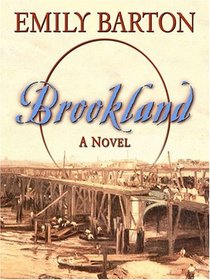Helpful Score: 6
I picked this up at a thrift store for $1 and then later thought I might not even read it. To be honest, the description really didn't sound all that interesting - a 500 page book about a girl who wants to build a bridge? Really?
I can say I was definitely wrong! I found myself reading this book every free chance I had, and I fell in love with the characters and the storyline. The end of the story is a little sad, and the ending is pretty abrupt (it almost makes you think, "Where's the rest of the story?!"), but I would still definitely recommend this book.
I can say I was definitely wrong! I found myself reading this book every free chance I had, and I fell in love with the characters and the storyline. The end of the story is a little sad, and the ending is pretty abrupt (it almost makes you think, "Where's the rest of the story?!"), but I would still definitely recommend this book.
Emily Barton is a great writer, her descriptions of 18th century Brooklyn and the resident Winships who run a gin distillery, are vivid and authentic (although I doubt New Yorkers in 1798 were referring to things as "weird" or "stupid"). The Winship family is interesting, however dour: Matthias and Roxana are the tragic parents of Prudence who takes over the family business (and dreams of one day building a bridge to span the East River to Mannahata), the ironically-named Temperance, and little vocally challenged Pearl. Their gin business is fascinating, especially what with the nascent feminism Winship & Daughters represents, and the love story between Prue and her childhood friend and husband Ben was lovely.
However, I simply could not accept the premise of this book, that Prue was ever consumed with guilt over having successfully "cursed" her youngest sibling into muted physical disability. I mean, she was five years old at the time - who even retains a memory from so early on for their whole life? And how would such an intelligent, sensible person perceive herself to be that ridiculously omnipotent? There were lots of other plot flaws too, I didn't understand why the Winships risked engaging in premarital sex; why not just get married? Mostly I was just wishing there was some premise of truth to the bridge story. Why have Ben blurt out "Tappan Zee" in the middle of the book if there's no connection with that bridge (built in 1950, it didn't even connect to Brooklyn)? Although the real life Brooklyn Bridge did have a wife involved with some limited aspect of its construction, this story bears no relation to that one. But I've always struggled in that way with the "historical fiction" genre.
However, I simply could not accept the premise of this book, that Prue was ever consumed with guilt over having successfully "cursed" her youngest sibling into muted physical disability. I mean, she was five years old at the time - who even retains a memory from so early on for their whole life? And how would such an intelligent, sensible person perceive herself to be that ridiculously omnipotent? There were lots of other plot flaws too, I didn't understand why the Winships risked engaging in premarital sex; why not just get married? Mostly I was just wishing there was some premise of truth to the bridge story. Why have Ben blurt out "Tappan Zee" in the middle of the book if there's no connection with that bridge (built in 1950, it didn't even connect to Brooklyn)? Although the real life Brooklyn Bridge did have a wife involved with some limited aspect of its construction, this story bears no relation to that one. But I've always struggled in that way with the "historical fiction" genre.
This is a well imagined look into Colonial Brooklyn featuring a girl, then woman who is chosen to learn her father's trade (no sons!)--he is a gin distiller. She is a natural at engineering it seems and quickly becomes obsessed with building a bridge to Manhattan. There is also an emotional story line of her relationships with family, and an interesting subtext about slavery in the North. A good read.




